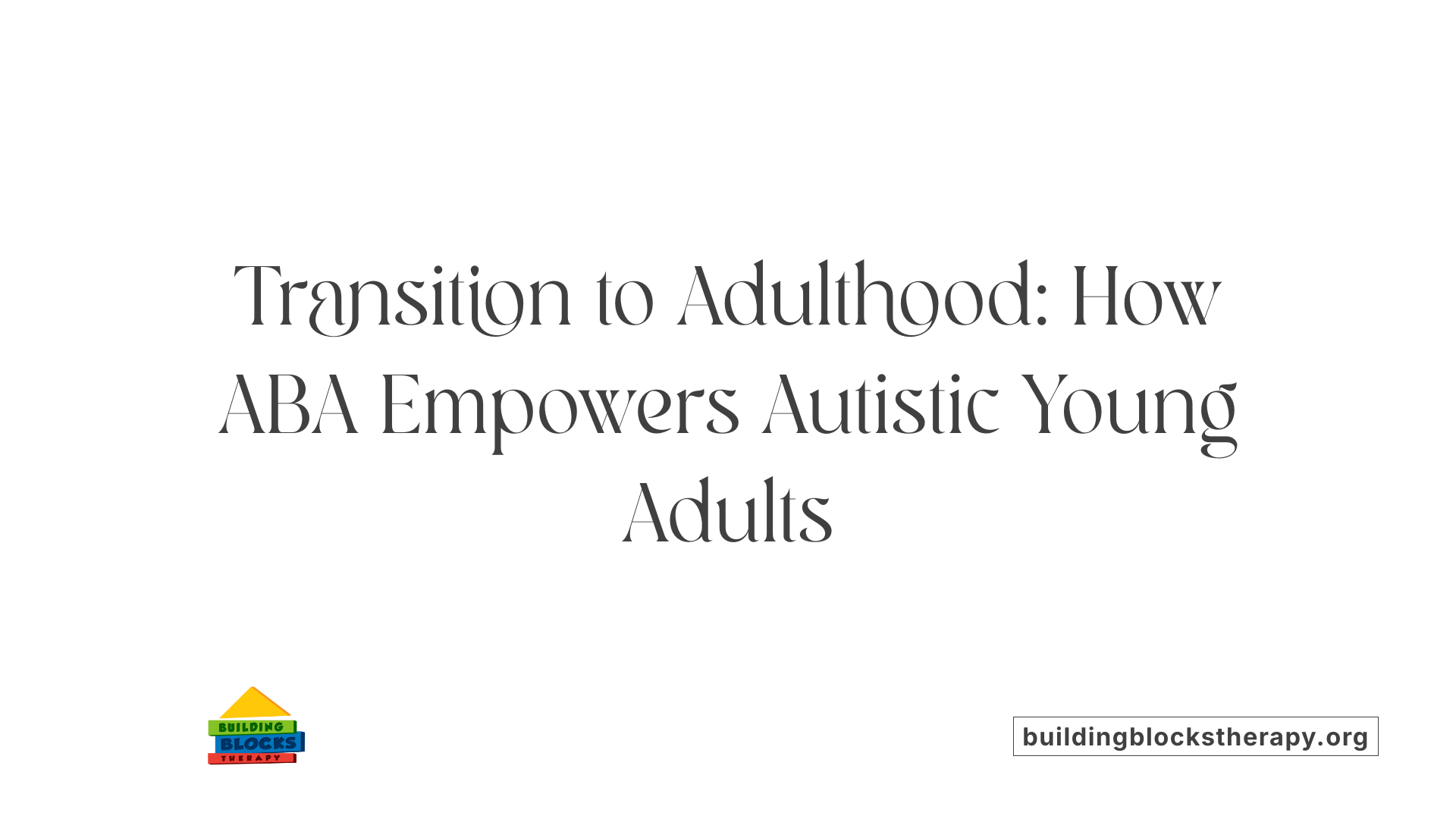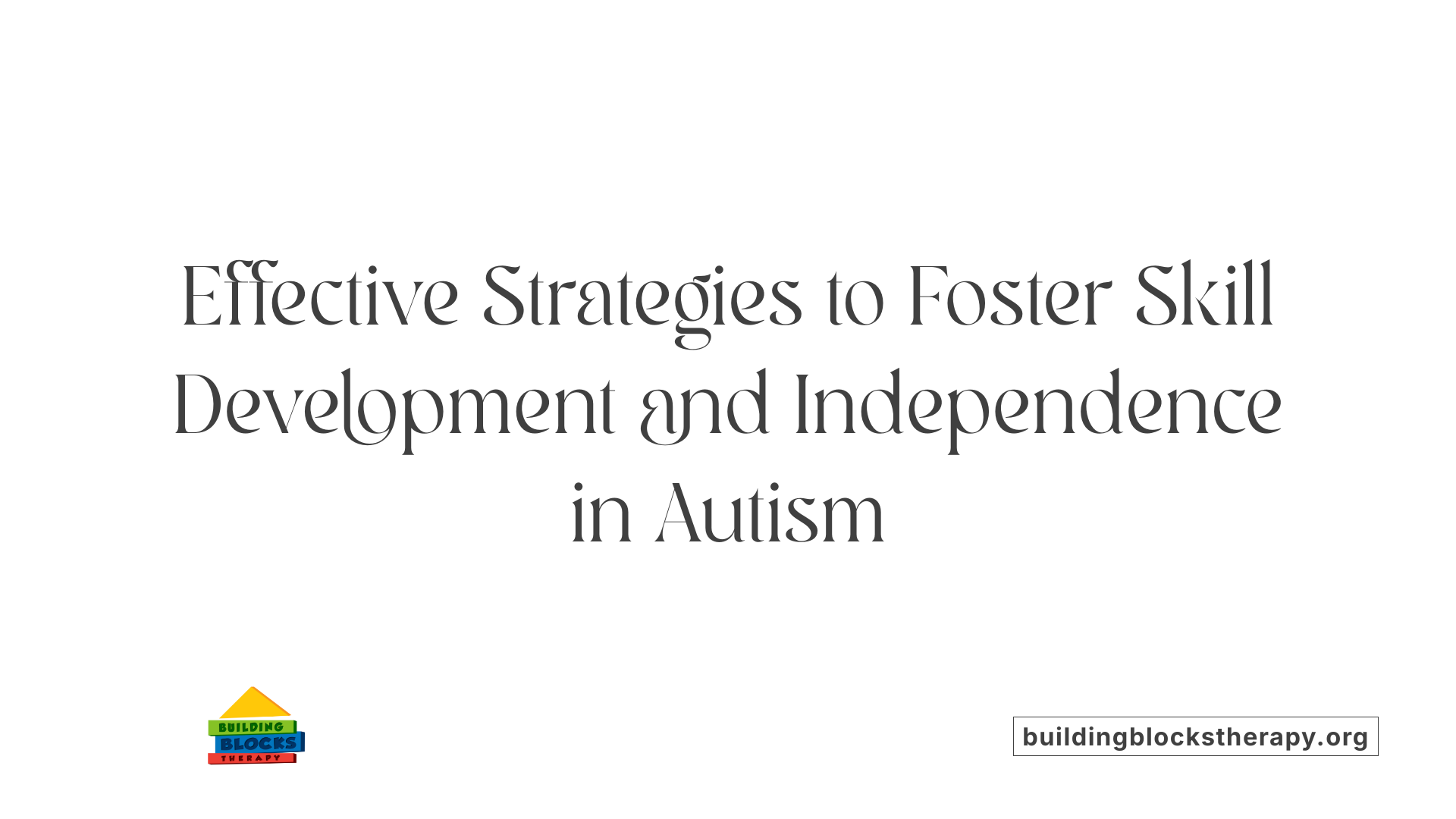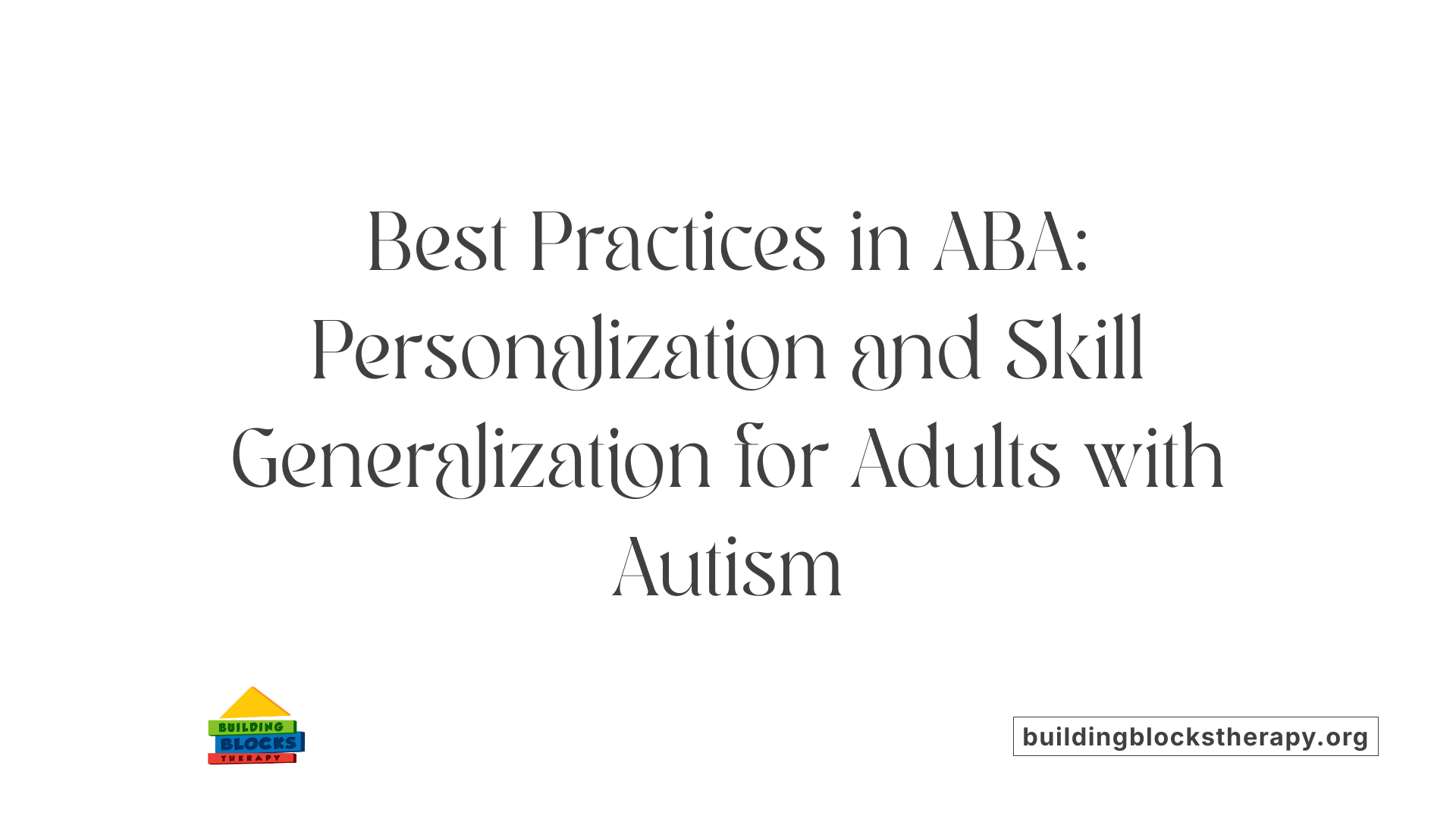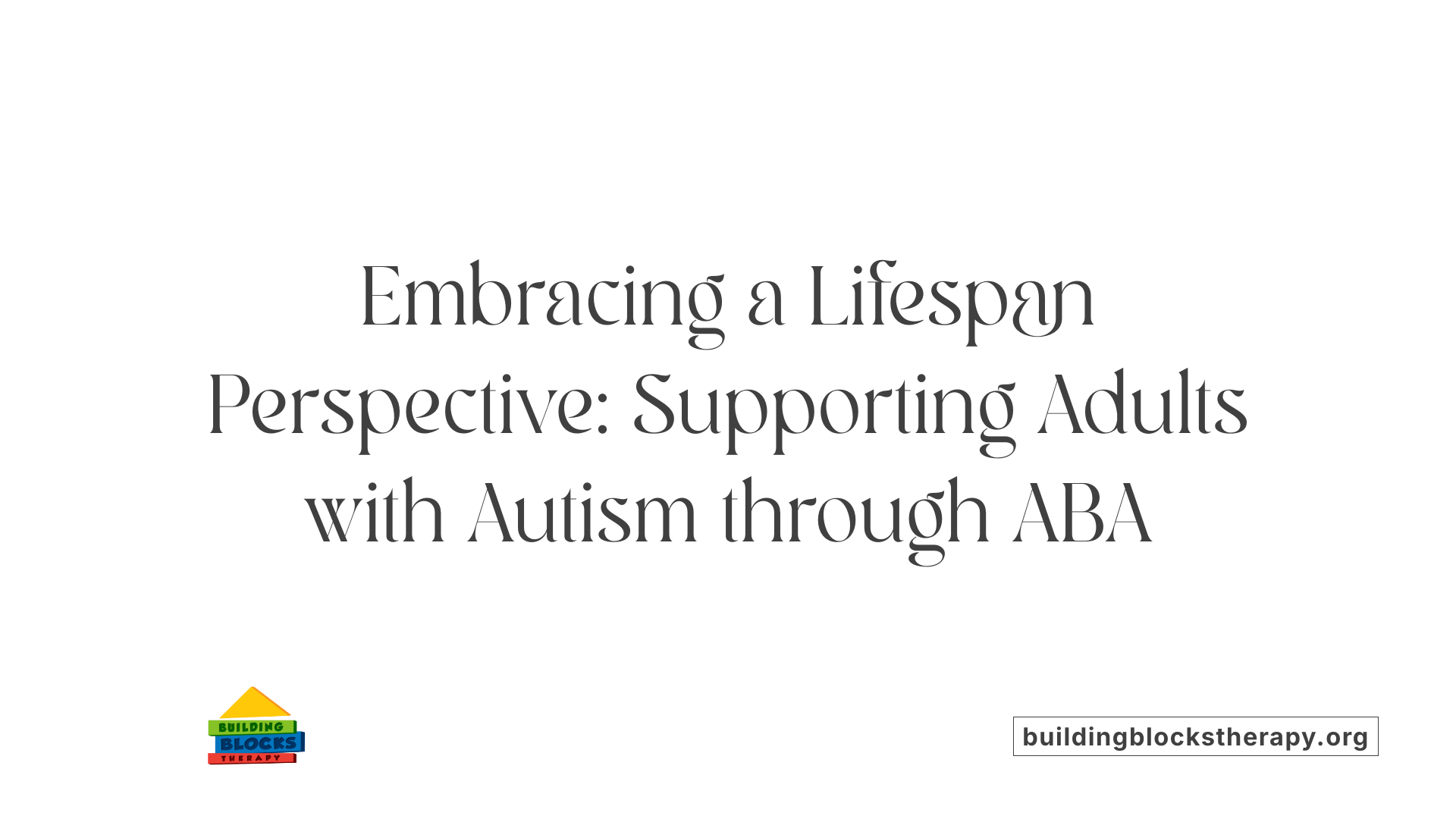A Lifelong Approach to Building Skills and Confidence
Transitioning into adulthood can be a challenging phase for individuals with autism spectrum disorder (ASD). Applied Behaviour Analysis (ABA) offers a scientifically grounded, adaptable framework designed to support individuals at this pivotal stage, fostering independence, improving social and communication skills, and enhancing overall quality of life. This article delves into how ABA therapy evolves from childhood to support adults, emphasizing individualized, evidence-based strategies that promote success in real-world settings.
The Benefits of ABA Therapy in Supporting Transition to Adulthood

Skills development in social, communication, and daily living areas
ABA therapy is essential in helping young adults with autism develop practical skills necessary for independent living. It focuses on enhancing social interaction by teaching understanding of social cues and fostering meaningful relationships. Communication skills such as speech therapy and use of AAC devices are often integrated, empowering individuals to communicate effectively and increase self-reliance. Daily living skills—like cooking, cleaning, managing finances, and personal hygiene—are taught through structured task analysis, promoting autonomy.
Behavior management and stress reduction
Managing behaviors and emotional regulation forms a core part of ABA interventions. Strategies include identifying behavioral triggers, employing positive reinforcement, and teaching coping skills like relaxation and mindfulness. These techniques help reduce problematic behaviors and manage stress, particularly during life changes, making the transition smoother and more manageable.
Long-term skill generalization and caregiver involvement
Successful transition depends on the generalization of skills across various settings and over time. ABA programs emphasize practicing skills in different environments and with different people, ensuring adaptability. Caregiver involvement through training and ongoing support sustains progress beyond therapy sessions. Data collection and regular assessment enable personalized adjustments, strengthening long-term outcomes.
| Aspect | Focus | Approach | Additional Details |
|---|---|---|---|
| Skills Development | Social, Communication, Daily Living | Tailored interventions, Visual supports, Modeling | Promotes independence and community participation |
| Behavior and Stress | Emotional Regulation, Behavior Reduction | Positive reinforcement, Relaxation strategies | Eases transition and improves overall well-being |
| Skill Transfer | Generalization across contexts | Ongoing practice, Caregiver training | Ensures skills are retained and adaptable |
Overall, ABA therapy plays a vital role in preparing autistic individuals for meaningful adult lives by fostering independence, emotional regulation, and social connectivity, supported by continuous assessment and caregiver partnership.
Strategies and Approaches to Facilitate Skill Development and Independence

What strategies and approaches are used in ABA therapy to facilitate skill development and independence for young adults with autism?
ABA therapy employs a variety of proven techniques to help young adults with autism gain new skills and become more independent. These methods include reinforcement strategies, prompting, modeling, and behavior chaining, all designed to encourage positive behaviors and reduce problematic ones.
Reinforcement, whether positive (rewards) or negative, is used to motivate desired behaviors, making it more likely they will be repeated. Prompting involves giving cues or assistance to help individuals perform a task, which is gradually faded as independence increases. Behavior chaining breaks down complex skills into small, manageable steps, allowing for sequential learning.
Visual supports like picture schedules, videos, and charts assist individuals in understanding sequences and expectations. These tools help in teaching daily living skills, communication, and social interactions. Additionally, behavioral strategies such as behavior contracts and extinction techniques are implemented to reinforce good behaviors and diminish challenging ones.
An individualized approach is central to ABA. Functional behavior assessments (FBAs) identify the reasons behind specific behaviors, guiding personalized treatment plans that focus on meaningful, socially relevant skills. Role-playing, real-world practice, and task analysis—breaking down tasks into simple steps—are regularly used to promote skill generalization outside therapy environments.
All these strategies work together within a structured, systematic framework. The goal is to foster independence, improve daily functioning, and enhance overall quality of life for young adults with autism by enabling them to navigate everyday situations confidently and successfully.
Supporting Life Skills and Goal Setting in Young Adults with Autism
How does ABA therapy support the development of life skills and goal setting for autistic young adults?
ABA therapy plays a crucial role in helping young adults with autism develop essential life skills and set meaningful goals. This approach begins with individualized planning, where comprehensive assessments identify specific needs and strengths of each person. Using behavioral science principles—like positive reinforcement and systematic instruction—therapists create tailored programs designed to teach practical skills.
One of the core methods involves breaking complex activities into smaller, manageable steps through a process called task analysis. For example, teaching cooking might include steps like gathering ingredients, measuring, and using appliances safely. These skills are practiced repeatedly across different settings, such as home, community, and workplace, to promote skill generalization.
Caregiver involvement is vital, ensuring support extends beyond therapy sessions. Regular data collection helps monitor progress, allowing therapists to adjust strategies as needed. This continuous feedback loop ensures that interventions remain effective and relevant.
The ultimate goal of ABA for young adults is to foster independence. This includes skills like managing personal hygiene, budgeting, using public transportation, and engaging in employment tasks. As these skills improve, confidence and self-sufficiency grow, empowering young adults to navigate daily life with less supervision.
By helping individuals reach their personal goals, ABA enhances overall quality of life. It promotes self-advocacy, autonomy, and the ability to participate fully in community and work environments. With ongoing support and tailored interventions, young adults with autism can achieve greater independence and a more fulfilling life.
Real-Life Successes and Challenges in ABA-Driven Transition

What are some real-life success stories and challenges related to ABA therapy during the transition to adulthood?
Many individuals with autism have experienced significant positive changes through ABA therapy, especially in their transition to independent adulthood. Success stories often highlight improved communication skills, greater self-sufficiency, and stronger social connections. For example, some young adults have learned to manage daily routines like cooking and personal hygiene, enabling them to live more independently. Others have gained employment skills, allowing them to participate actively in the workforce and community life.
However, this journey is not without obstacles. Variability in how individuals respond to ABA interventions can affect the speed and extent of progress. Some adults may struggle to generalize skills across different settings or face difficulties due to gaps in ongoing support services. Limited access to continued ABA services and resources can also hinder long-term success, especially after transitioning out of school-based programs.
To address these challenges, therapists often use tailored strategies such as visual supports, positive reinforcement, and identifying personal triggers. These approaches help meet each person’s unique needs and promote sustained growth. Consistent collaboration among families, caregivers, and professionals is vital to overcome barriers. Overall, despite some difficulties, ABA therapy remains a powerful tool that has helped many adults with autism achieve meaningful independence and participate fully in their communities.
Best Practices, Individualization, and the Role of Generalization in ABA for Adults

What are best practices, the importance of individualization, and the role of generalization in ABA therapy for supporting adults with autism?
Effective ABA therapy for adults with autism starts with creating highly personalized treatment plans. These plans are developed through thorough assessments that identify each individual’s strengths, challenges, and specific goals. Tailoring interventions ensures that therapy addresses real-world, practical skills such as communication, daily routines, and job-related abilities. This personalized approach helps promote genuine independence and a better quality of life.
Incorporating evidence-based methods is vital. Techniques like positive reinforcement, systematic instruction, and continuous data collection allow therapists to monitor progress and make necessary adjustments. This scientific approach ensures that interventions remain effective and relevant over time.
A crucial aspect of adult ABA therapy is ensuring skills are not only learned but also transferable across different contexts. This is where the concept of generalization comes in. Strategies are intentionally designed so individuals can apply new behaviors in various situations, whether at home, work, or social settings. This focus on transferability guarantees that gains are sustainable and have a lasting impact.
Collaboration with support networks such as families, employers, and community services enhances the effectiveness of interventions. Continuous monitoring and flexible adjustments to the therapy plan enable individuals to adapt to life’s evolving demands.
Overall, adult ABA programs emphasize personalized, scientifically-supported strategies that foster independence, improve operational skills, and enhance well-being. The integration of individualization and generalization techniques ensures meaningful, long-term progress in everyday life.
Holistic and Lifespan Approach to ABA in Adult Autism Support

How does ABA therapy support the development of life skills and goal setting for autistic young adults?
ABA therapy is designed not only for children but also for young adults, ensuring support evolves as individuals transition into independence. It focuses on teaching socially meaningful skills such as communication, daily living activities, social interaction, and vocational abilities.
In practice, ABA programs for young adults often break down complex skills into manageable steps. For example, learning to manage personal finances, cook nutritious meals, or use public transportation evolves through repetitive practice, prompting, and positive reinforcement.
Customized goals are set to match each person's interests and needs, fostering motivation and engagement. Data collection throughout the process allows practitioners to monitor progress, adjust strategies, and ensure skills are retained and generalize across environments—home, community, and work.
Supporting goal setting and skill development prepares autistic young adults for real-world challenges, promoting independence while respecting their individual aspirations.
Applicability of ABA Therapy Throughout the Lifespan
ABA therapy's benefits extend across all ages, with early interventions establishing foundational skills and ongoing support assisting with complex life transitions.
During adolescence and into adulthood, ABA helps develop vital areas such as emotional regulation, relationship building, and self-advocacy. The structured approach adapts to changing needs, fostering continuous growth.
Programs like the Young Adult Program by Proven Behavior Solutions exemplify this lifespan approach. They emphasize increasing independence, developing life skills, and supporting community integration.
The Role of Early Planning and Ongoing Support
Early planning—starting around age 12 to 14—is essential for a successful transition into adult life. Transition services, mandated by law for students with IEPs, should include detailed behavioral and skills training.
This preparation ensures each individual acquires necessary skills before leaving formal education systems, preventing skill loss and supporting ongoing development. Active involvement from families and collaboration with community resources are crucial.
Long-term success depends on continuous, tailored ABA support that promotes self-determination, reduces challenging behaviors, and enhances quality of life.
Integration with Community Resources
Effective transition planning involves connecting individuals with community services, employment programs, and social support networks. ABA strategies can be integrated into these settings to reinforce learned skills and encourage generalization.
partnerships with local agencies and employers facilitate inclusive environments, enabling autistic adults to thrive in their chosen pathways. Staff training in ABA and regular oversight help maintain high-quality, individualized support.
By embracing a lifespan perspective and fostering strong community ties, ABA therapy can significantly improve the independence and overall well-being of autistic adults.
The Critical Role of Early Transition Planning and Family Involvement
What are the best practices, the importance of individualization, and the role of generalization in ABA therapy for supporting adults with autism?
Effective ABA therapy for adults with autism relies heavily on tailored, evidence-based strategies focused on real-world skills. One of the best practices is developing highly individualized treatment plans, which are created through comprehensive assessments involving both the individual and their family. These assessments help identify specific strengths, areas for growth, and personal goals, ensuring that intervention strategies are relevant and practical.
Personalization in ABA promotes the learning of essential skills such as communication, daily living routines, and vocational abilities. This targeted approach enhances independence and self-confidence, leading to better integration into community life.
A crucial aspect of successful ABA interventions is the concept of generalization. This means that skills learned in one setting, like a therapy session, must be applied across various environments and situations, such as at home, school, or work. Facilitation of generalization involves using different people, materials, and contexts during therapy sessions to help individuals transfer their skills into everyday life.
Strategies like positive reinforcement, systematic prompting, modeling, and the use of visual supports underpin these individualized plans. Data collection throughout therapy allows clinicians to monitor progress accurately and make necessary adjustments, optimizing long-term benefits.
Involving families and support networks is vital, ensuring consistency and reinforcement outside of structured sessions. This collaborative approach helps embed skills into daily routines, allowing adults with autism to live more independently and participate actively in society.
Overall, ABA therapy for adults emphasizes personalized, flexible interventions, supported by ongoing assessment and collaborative efforts, to foster meaningful improvements in daily functioning and quality of life.
Building a Foundation for the Future
As individuals with autism move into the broader phases of adulthood, tailored ABA therapy remains a cornerstone in supporting their journey toward independence. By emphasizing personalized interventions, continuous assessments, and collaborative approaches, ABA empowers young adults to achieve meaningful life skills, build confidence, and navigate their daily routines. Early planning and ongoing support are vital to maximize outcomes, addressing challenges while celebrating successes. With dedicated application of evidence-based strategies, ABA therapy can significantly enhance the quality of life and promote self-sufficiency, laying a robust groundwork for a successful and fulfilling adult life.
References
- How Can ABA Therapy Benefit Adults - Quality Behavior Solutions
- Transition to Adulthood: Supporting Young People with Autism - Beam
- What can ABA offer young adults with autism?
- Ways ABA Enhances Health and Independence for Autistic Adults
- Transition to Adulthood | Autism Speaks
- Autism and the Transition to Adulthood (Part 1) - Blog
- The Transition to Adult Services: Two Parents' Journeys
- ABA Techniques: Strategies for Behavior Analysts - GSEP Blog
- Applied Behavior Analysis (ABA) | Autism Speaks






